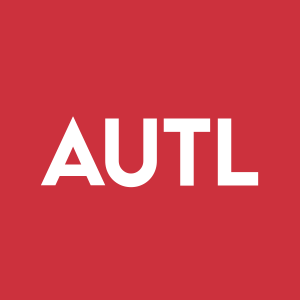Autolus Therapeutics Announces Publication in Molecular Therapy Nucleic Acids
Autolus Therapeutics (Nasdaq: AUTL) announced a significant advancement in T-cell engineering with the publication of research that enhances CAR T-cell efficacy against solid tumors by preventing apoptosis caused by Fas ligand. The study, detailed in Molecular Therapy Nucleic Acids, highlights the development of Fas-TNFR chimeras that not only inhibit FasL-mediated cell death but also stimulate CAR T-cell proliferation. Among these, the Fas-CD40 fusion was noted for its effectiveness in improving anti-tumor response in FasL presence. This research expands Autolus' toolkit against complex cancers and aligns with its strategy to enhance T-cell therapy applications, particularly for solid tumors. The findings position Autolus as a key player in advancing cancer treatment through targeted therapies.
- Publication of research in Molecular Therapy Nucleic Acids enhances CAR T-cell efficacy.
- Development of Fas-TNFR chimeras to prevent FasL-mediated cell death.
- Specific Fas-CD40 fusion chimeras show effectiveness in solid tumor applications.
- None.
- Expanding the Autolus toolkit of T-cell engineering modules against complex and immunologically hostile cancers, including solid cancer applications
LONDON, April 26, 2023 (GLOBE NEWSWIRE) -- Autolus Therapeutics plc (Nasdaq: AUTL), a clinical-stage biopharmaceutical company developing next-generation programmed T cell therapies, today announced the publication of a paper in Molecular Therapy Nucleic Acids1, titled ‘Novel Fas-TNFR chimeras that prevent Fas ligand-mediated kill and signal synergistically to enhance CAR T-cell efficacy.’
CAR T cells have shown remarkable efficacy against hematological cancers, but their effectiveness in solid tumors has been limited by inhibitory factors expressed by the tumor or its microenvironment. One such inhibitory factor is Fas ligand (FasL), which binds to the Fas receptor (CD95) on the surface of an activated T cell and triggers the CAR T cell to die by apoptosis.
The research group at Autolus tested several Fas chimeras which consist of the extracellular domain of Fas fused to the intracellular domain from different TNF receptor superfamily members. Expression of these chimeras in a CAR T cell not only blocks apoptosis triggered by FasL, but results in co-stimulation, which promotes CAR T cell survival and proliferation.
A small subset of these chimeras, best exemplified by Fas-CD40 fusion, were found to be particularly effective at promoting CAR T cell survival and anti-tumor cytotoxicity in the presence of FasL. These data support the potential of this Fas-CD40 chimera to render T cell therapies resistant to FasL-mediated cell death and improve their effectiveness against solid tumors.
Martin Pule, Chief Scientific Officer and Founder of Autolus said, "Development of Fas-CD40 adds to our growing toolkit of T-cell engineering modules and aligns with Autolus’ strategy for increasing the Company’s capabilities, with particular application against complex and immunologically hostile cancers, including solid cancer applications.”
About Autolus Therapeutics plc
Autolus is a clinical-stage biopharmaceutical company developing next-generation, programmed T cell therapies for the treatment of cancer. Using a broad suite of proprietary and modular T cell programming technologies, the Company is engineering precisely targeted, controlled and highly active T cell therapies that are designed to better recognize cancer cells, break down their defense mechanisms and eliminate these cells. Autolus has a pipeline of product candidates in development for the treatment of hematological malignancies and solid tumors. For more information, please visit www.autolus.com.
Forward-Looking Statements
This press release contains forward-looking statements within the meaning of the "safe harbor" provisions of the Private Securities Litigation Reform Act of 1995. Forward-looking statements are statements that are not historical facts, and in some cases can be identified by terms such as "may," "will," "could," "expects," "plans," "anticipates," and "believes." These statements include, but are not limited to, statements regarding the continued development of Autolus’ AUTO1/22 program; the status of clinical trials (including, without limitation, expectations regarding the data that is being presented, the expected timing of data releases and development, as well as completion of clinical trials) and development timelines for the Company’s product candidates. Any forward-looking statements are based on management's current views and assumptions and involve risks and uncertainties that could cause actual results, performance, or events to differ materially from those expressed or implied in such statements. These risks and uncertainties include, but are not limited to, the risks that Autolus’ preclinical or clinical programs do not advance or result in approved products on a timely or cost effective basis or at all; the results of early clinical trials are not always being predictive of future results; the cost, timing, and results of clinical trials; that many product candidates do not become approved drugs on a timely or cost effective basis or at all; the ability to enroll patients in clinical trials; possible safety and efficacy concerns; and the impact of the ongoing COVID-19 pandemic on Autolus’ business. For a discussion of other risks and uncertainties, and other important factors, any of which could cause Autolus’ actual results to differ from those contained in the forward-looking statements, see the section titled "Risk Factors" in Autolus' Annual Report on Form 20-F filed with the Securities and Exchange Commission on March 7, 2023, as well as discussions of potential risks, uncertainties, and other important factors in Autolus' subsequent filings with the Securities and Exchange Commission. All information in this press release is as of the date of the release, and Autolus undertakes no obligation to publicly update any forward-looking statement, whether as a result of new information, future events, or otherwise, except as required by law.
Contact:
Julia Wilson
+44 (0) 7818 430877
j.wilson@autolus.com
Susan A. Noonan
S.A. Noonan Communications
+1-917-513-5303
susan@sanoonan.com
Alexandra Deschner
+32-490-58-35-23
a.deschner@autolus.com

FAQ
What did Autolus Therapeutics announce in April 2023?
How do Fas-TNFR chimeras improve CAR T-cell therapies?
What is the significance of the Fas-CD40 fusion chimera announced by Autolus?
Where was the research published?







